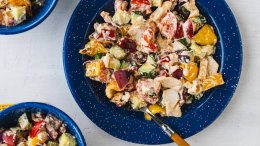It’s widely recognized that people eat in response to negative emotions. In fact, emotional eating as a whole is formally defined as eating in response to negative emotions, in the absence of actual physical hunger. Whether you engage in this behaviour or not (and I will argue that we are all prone to it from time to time), it is widely recognized, both on a personal level and in popular media, that many people’s reactions to feelings of stress, anxiety, frustration, and such, is to eat. There’s also decades worth of research to support this. In negative emotional contexts, food can serve as a coping mechanism. In other words, if you’re feeling down, food can help to repair your mood and make you feel better.
But what about positive emotions? Do people eat in response to these feelings too? Your gut reaction might be to say yes, but recent research from the Netherlands suggests otherwise. Van Strien, Donker, and Ouwens (2016) decided to look into the idea that positive emotions--feeling cheerful, energetic, merry, lively, and happy--may also contribute to overeating and heightened body mass index (BMI). To test this, they examined if people’s self-reported tendencies to eat in response to both positive and negative emotions predicted actual food intake in a bogus “taste test” (participants were given a sample of cookies under the assumption that they were taste testing them, but rather, the researchers just wanted to see how much they consumed).
Supporting the hypothesis that people do eat in response to positive emotions, they found that higher self-ratings of eating in response to positive emotions correlated with increased food consumption in the bogus taste test. However, when they divided the sample based on weight, this relationship was not present in people who were overweight. Even more interesting is that when they controlled for people’s tendencies to eat in response to negative emotions, the effect of eating in response to positive emotions on food intake disappeared. In other words, overconsumption in response to positive emotions may be better accounted for by the fact that people who do so also tend to have negative emotional eating tendencies. So it may be that negative emotions, over and above positive emotions, are more likely to lead to eating and subsequent weight gain over time.
In a way, these results make sense. Eating in response to negative emotions, by nature, tends to be associated with heightened distress. Your relationship with food in this context is completely different from eating in response to positive emotions, because you are using it to help make you feel better. When you eat in response to positive emotions, you are already feeling good, so although you might eat to celebrate or reward yourself, your motivations are much different.
Eating in response to positive emotions is also difficult to study because it is nearly impossible to pry apart the internal and external factors involved. For example, it isn’t uncommon for someone to eat too much at a social event, like a birthday party. Chances are, in this situation, you’re also in a good mood, surrounded by your friends, family, and of course, good food. So if you overeat, what’s to blame? Is it really the fact that you’re over-the-moon happy, or is it because you’re in a social context that facilitates overconsumption? If everyone else at the party disappeared and you were in the same elated mood, would you still eat so much? Chances are, probably not.
Another common scenario that might be framed as eating in response to positive emotions is when food is used as a reward. I think we can all agree that if you are happy with yourself for going to the gym, the cookie you eat after the fact isn’t consumed because you are happy, but because you are rewarding yourself for working out, thus motivating you to continue doing so. Eating can also be celebratory. Say you go out for a fancy dinner after you find out that you have been promoted at work. Of course you’re cheerful, happy, energetic, and all of the other positive emotions van Strien et al. (2016) looked at in their study. But are you eating exclusively due to these emotions, or rather because you want to reward yourself for a job well done and celebrate the payoff of all of your hard work?
I could be wrong, but I can’t think of a scenario where internal positive emotions are exclusively responsible for eating, without any influence from external social factors. Maybe eating in response to positive emotions does occur, but as van Strien et al. (2016) suggest, it doesn’t seem to be consistently associated with overeating or heightened weight. Food is inherently social and will almost always be enjoyed in the context of positive, celebratory situations. Unlike eating in response to negative emotions, which you could argue that it could and does occur nearly every day under periods of stress for some, it seems less likely that eating in response to positive emotions on one-off occasions would have any significant effect on weight gain over time. So if you have reason to celebrate, and want to do it with a glass of champagne followed by a decadent 10-course meal, why not? If you’re already happy, there’s no need to change that for the worse.
Reference
Van Strien, T., Donker, M. H., & Ouwens, M. A. (2016). Is desire to eat in response to positive emotions an ‘obese’ eating style: Is Kummerspeck for some people a misnomer? Appetite, 100, 225-235.













